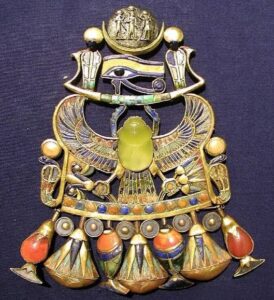Introduction
One of the most outstanding pieces of jewelry discovered in the tomb of Pharaoh Tutankhamun is a golden pendant, found during the historic excavations from 1922 to 1923. This pendant serves as a testament to the exquisite craftsmanship and artistry of ancient Egyptian civilization, particularly from the 18th Dynasty (circa 1332–1323 BC).
Design and Craftsmanship
This pendant is intricately inlaid with semiprecious stones and colored glass, creating a beautiful and meaningful image. The focal point of the design is a winged scarab, which holds a lotus flower in one claw and a papyrus flower in the other, symbolizing Upper and Lower Egypt. This not only reflects the confluence of two cultures but also embodies the Pharaoh’s power as the ruler of the entire land.

Symbolism and Meaning
The pendant is further adorned with two uraei (cobras), symbolizing protection and royal authority. The presence of these symbols not only enhances the aesthetic value but also affirms the Pharaoh’s role as a protector of the nation and its people. The gold frame surrounding the central design not only highlights the main composition but also supports additional pendants shaped like lotus and papyrus flowers, which represent life and rebirth.
Divine Symbols
A particularly striking detail in the pendant is the slender solar boat resting beneath the front feet of the scarab. This boat carries the Udjat eye (eye of Horus), a symbol of protection and health. Additionally, the Udjat eye is flanked by two cobras, further emphasizing the theme of divine guardianship for the Pharaoh. Atop the eye is a crescent moon made of gold, along with a silver disk adorned with images of the gods Thoth and Re-Horakhty, symbolizing wisdom and the solar aspect of the king, creating a comprehensive image of Tutankhamun’s greatness and divinity.

Conclusion
Tutankhamun’s golden pendant is not merely a precious piece of jewelry but also a work of art that reflects the complexity and depth of ancient Egyptian culture. With its rich symbolism and intricate craftsmanship, this artifact offers profound insights into the beliefs and values of ancient Egyptians while highlighting the cultural legacy of one of history’s most famous kings. Although Tutankhamun reigned for a brief period, his legacy lives on through exquisite artistic creations like this pendant.
